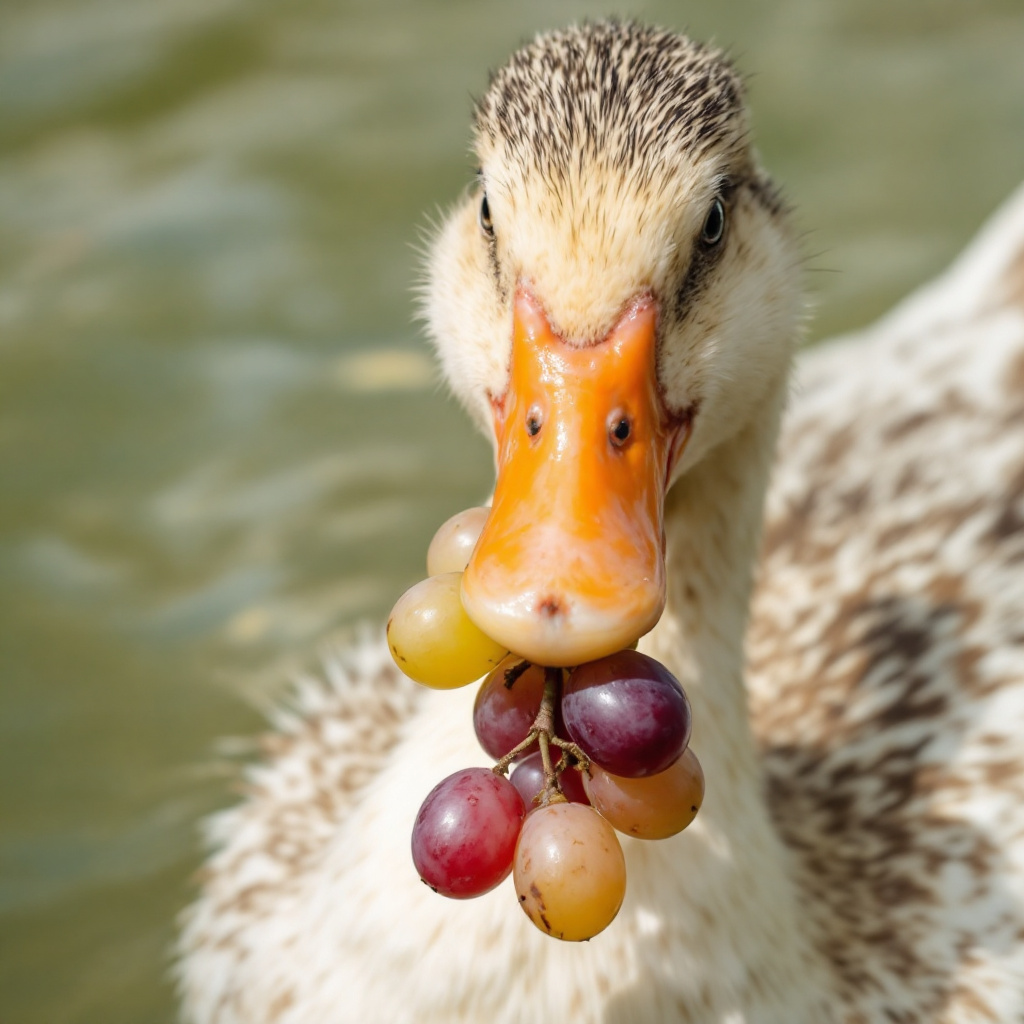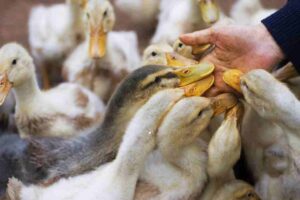Ducks are versatile eaters and enjoy a variety of treats, from vegetables to fruits. If you own ducks or are considering raising a flock, it’s natural to wonder which foods are safe for them. One question duck owners frequently ask is, Can ducks eat grapes? The answer is yes, ducks can safely enjoy grapes, and they often love them! there are a few guidelines to follow to ensure grapes are a healthy addition to your ducks’ diet.
In this article, we’ll explore the nutritional benefits of grapes, how to feed them to ducks safely, potential risks, and tips for incorporating grapes into your ducks’ diet.
Nutritional Benefits of Grapes for Ducks
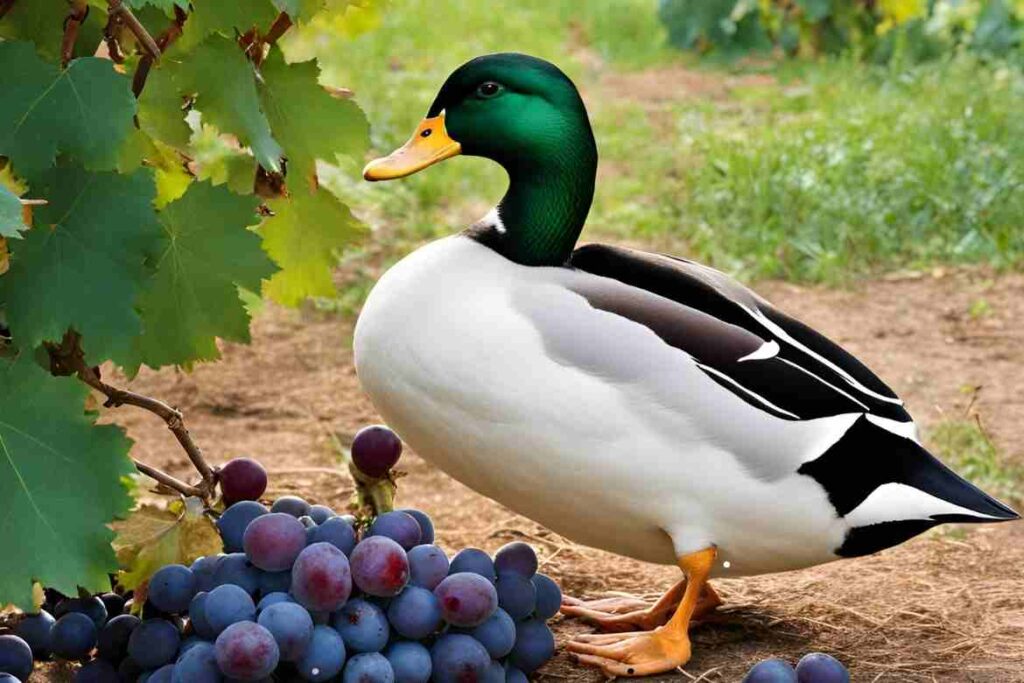
Can ducks eat grapes? Grapes are packed with vitamins, minerals, and antioxidants that are beneficial to ducks. Here’s a closer look at the main nutrients in grapes and how they contribute to a duck’s health:
- Vitamins
Grapes are rich in Vitamin C, Vitamin K, and various B vitamins. Vitamin C is crucial for boosting the immune system, while Vitamin K plays an important role in blood clotting and bone health. B vitamins help in energy production and maintaining a healthy metabolism. - Antioxidants
Grapes contain antioxidants like resveratrol and flavonoids, which help protect a duck’s cells from damage caused by free radicals. Antioxidants also support heart health and help prevent inflammatory conditions. - Minerals
Minerals in grapes, such as potassium and manganese, are essential for ducks. Potassium aids in muscle function and fluid balance, while manganese contributes to bone development and energy metabolism. - Water Content
Grapes have a high water content, which helps keep ducks hydrated, especially during hot weather. Ducks benefit from foods with high water content as it supports their overall hydration levels. - Natural Sugars and Fiber
The natural sugars in grapes provide a quick energy boost, and the fiber aids in digestion. Although fiber is beneficial, too much can lead to digestive upset, so moderation is key.
How to Safely Feed Grapes to Ducks
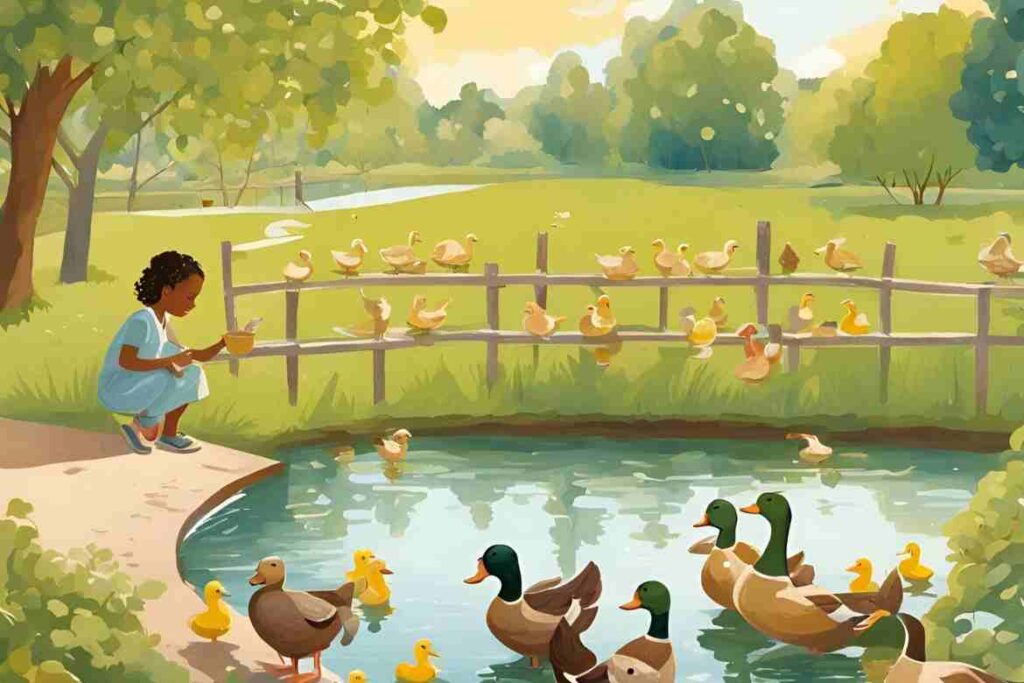
While ducks can eat grapes, it’s essential to prepare and serve them correctly to avoid potential risks. Here’s how to feed grapes to ducks safely: What Do Ducks Eat In The Wild? Ducks in the wild are adaptable eaters, Explore the journey with me.
- Portion Size
Grapes should be served in moderation, as their high sugar content can lead to obesity or other health issues in ducks if overfed. A few grapes per duck once or twice a week is usually enough to provide health benefits without risking digestive issues. - Cutting Grapes into Pieces
Whole grapes can be a choking hazard, particularly for ducklings or smaller ducks. Always cut grapes in half or quarters before feeding them to ducks. This also makes it easier for them to eat and digest. - Offering Grapes Fresh and Clean
Make sure to wash grapes thoroughly to remove pesticides or any harmful chemicals. Feeding ducks organic grapes or grapes you know are chemical-free is ideal. Fresh grapes are preferable, as spoiled or moldy grapes can cause digestive problems. - Introduce Grapes Gradually
If you’re introducing grapes for the first time, start with small amounts and monitor your ducks for any adverse reactions. Ducks typically tolerate grapes well, but individual reactions can vary.
Potential Risks of Feeding Grapes to Ducks
While grapes can be a healthy treat, there are some potential risks associated with feeding them to ducks. Here are the key concerns and how to manage them:
- High Sugar Content
Ducks are prone to weight gain and can develop obesity-related health issues if they consume too much sugar. Since grapes have a high natural sugar content, overfeeding can lead to weight issues and metabolic problems. Offering grapes as an occasional treat rather than a staple food helps prevent these issues. - Digestive Upset
The fiber in grapes, while beneficial in small amounts, can cause digestive issues if ducks consume too much. This can lead to symptoms such as loose stools or bloating. Balance grapes with other fibrous foods and treats to avoid overwhelming their digestive systems. - Choking Hazard
Whole grapes, especially larger ones, pose a choking risk for ducks. This is especially true for ducklings, whose throats are smaller. Cutting grapes into small, manageable pieces is essential for safety. - Risk of Overfeeding Treats
Feeding ducks too many treats can reduce their intake of nutritionally complete duck feed, which provides the essential nutrients they need. To avoid nutrient deficiencies, treats like grapes should make up no more than 10% of a duck’s daily diet.
Benefits of Adding Grapes to a Duck’s Diet
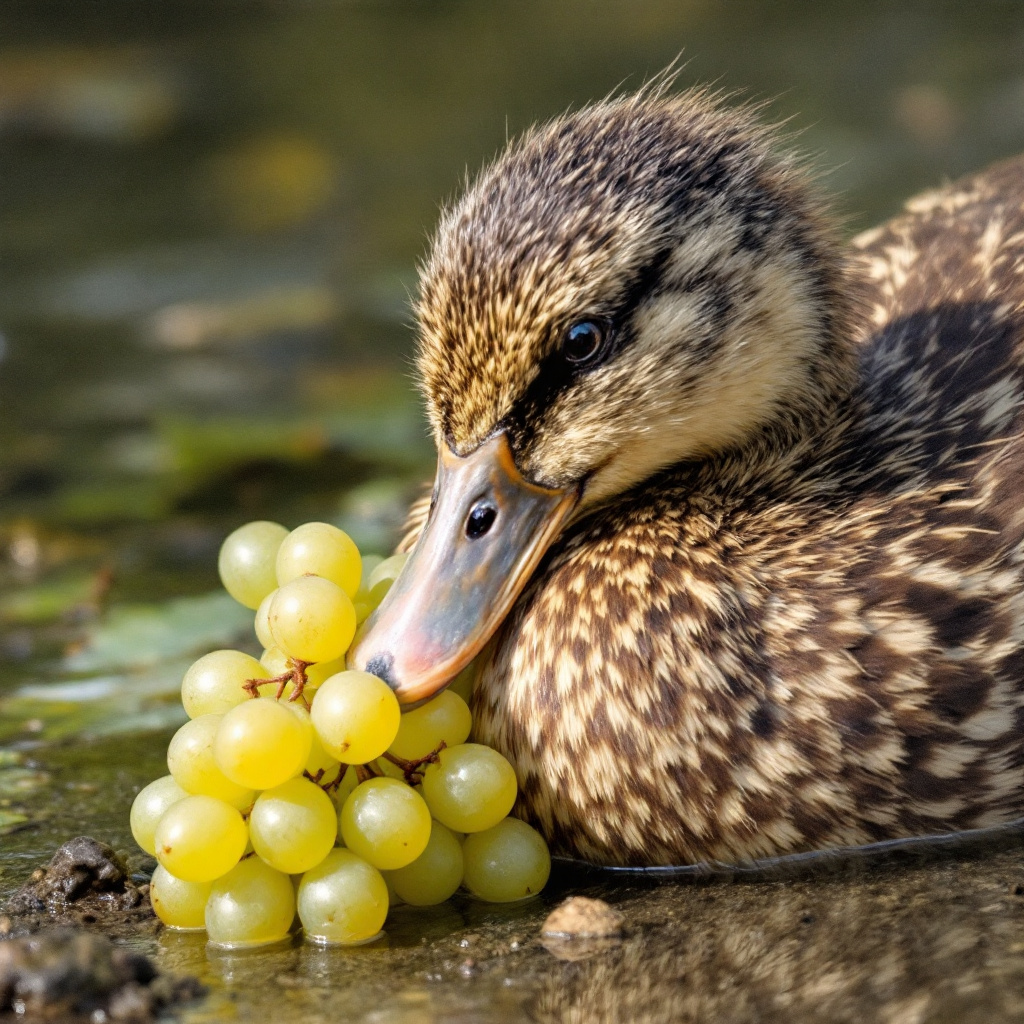
When fed appropriately, grapes can be a great source of variety in a duck’s diet and can contribute to their overall well-being. Here’s a summary of the primary benefits:
- Supports Hydration
The high water content of grapes helps keep ducks hydrated, particularly during warm weather when they may need more water than usual. One more question that confused is Can Ducks Eat Chocolate? Ducks should never be fed chocolate yes. Read and explore all info: - Promotes Energy
The natural sugars in grapes can provide ducks with a quick burst of energy, which is particularly useful if they’re free-ranging or active. - Enhances Diet Diversity
Grapes add variety to a duck’s diet, which can help prevent boredom and encourage them to eat more readily. Ducks that enjoy their food are typically healthier and more active.
Signs That Ducks Enjoy Grapes
Ducks can show clear signs of enjoyment when offered treats like grapes. Here are some behaviors to look out for:
- Excitement and Eagerness
Ducks may crowd around eagerly when grapes are offered, quacking and moving quickly toward the treat. - Enthusiastic Eating
If your ducks eat the grapes enthusiastically and leave nothing behind, it’s a strong indicator that they enjoy the fruit. - Pecking for More
Some ducks will continue to peck at you or show signs of anticipation for more grapes once they’ve had a taste. Just remember to keep treats in moderation.
Other Fruits and Treats Ducks Can Enjoy
While grapes are a safe treat for ducks, there are several other fruits and foods that make excellent treats. Here are some options to consider:
- Fruits: Apples (without seeds), blueberries, watermelon, cantaloupe, and strawberries.
- Vegetables: Peas, leafy greens, cucumber, and corn.
- Grains and Seeds: Cracked corn, oats, and sunflower seeds.
- Protein-Rich Treats: Mealworms, cooked eggs, and insects.
Offering a variety of treats helps maintain a balanced diet and keeps your ducks interested in their food.
Common Myths about Feeding Grapes to Ducks
Can ducks eat grapes? everal myths surround feeding grapes and other fruits to ducks. Let’s clear up some of the misconceptions:
- Myth: Ducks Should Only Eat Grains
While grains are a major part of a duck’s diet, they benefit from a balanced diet that includes fresh fruits and vegetables, which provide essential nutrients not found in grains. - Myth: Grapes Are Toxic to Ducks
Unlike some animals, ducks can safely eat grapes. However, moderation is key, as overfeeding any treat can lead to health issues. - Myth: Only Adult Ducks Can Eat Grapes
Ducklings can enjoy grapes too, but the fruit should be offered in smaller, cut-up pieces to avoid choking hazards.
Conclusion
One question that bird owner asked Can ducks eat grapes? Grapes can be a nutritious and enjoyable treat for ducks when fed safely and in moderation. Their high water content, vitamins, minerals, and antioxidants make them a great occasional addition to a balanced diet. However, due to the high sugar content, grapes should only be offered as an occasional treat to avoid digestive issues or weight gain.
Always remember to prepare grapes by cutting them into small pieces and washing them thoroughly to ensure the safety and well-being of your ducks. By following the guidelines and recommendations in this article, you can provide your ducks with a delicious, healthy treat that adds variety to their diet and keeps them happy and active.
- Male Black Widow Spider Markings - March 23, 2025
- Mexican Red Headed Bird: A Brilliant Avian Wonder - January 16, 2025
- Can Turkeys Eat Bread? - January 15, 2025
